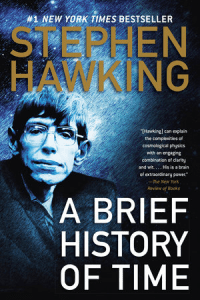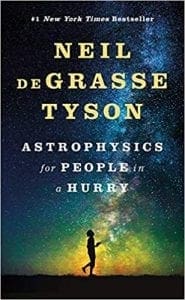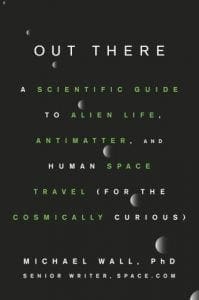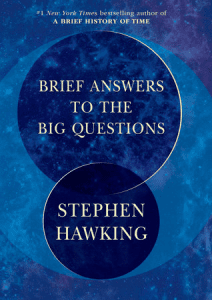For most people, the topic of our universe is too daunting and intimidating to think about. I know the feeling. When the subject gets brought up, your head starts to hurt and you’re convinced this is beyond your intelligence. But I learned, just as I hope you all will, that it doesn’t have to be this way. There are endless materials to aid you in this process, including this list of books that will help you understand the universe. Learning about the cosmos is well within anyone’s cognitive ability, and the fear and intimidation will quickly turn to excitement and curiosity.
Discovering where to get started is perhaps the most challenging part. In the following, you’ll find the descriptions of four books, all of which are perfect if you’re a beginner. However, even if you have some prior knowledge, these books will still be fascinating and insightful. There’s some slight crossover in the topics discussed in each book; for example, every book has some mention of the possibility of life beyond our planet. But this overlapping is an intentional feature of the list. These topics are notably deep, and at times complex, so it can be helpful to hear from multiple perspectives.
Don’t Expect Boring Science
The books provide a sound knowledge base and address commonly held misconceptions that you may or may not have. I started learning about the universe by reading each of them; even though science was always my least favorite subject in school, and I was convinced it would be too hard or tedious to understand, I was wrong.
These authors aren’t writing for an audience of astrophysicists or doctors, like them. They’re writing for the average person. These scientists write like writers and never miss an opportunity to capture intrigue and imagination. They don’t focus on the dull details that might bore the average reader; they bring in the exciting and mind-twisting aspects of science, such as analyzing the prospects of time travel, what would happen if you traveled through a black hole and much else. These books push the boundaries of imagination by turning ideas we’ve seen from science-fiction into factual possibilities.
The Difference Between Space and the Universe
Before we get to the books, I want to clarify something to avoid confusion. As you may have noticed thus far, I only have used the term “universe,” and I haven’t mentioned “space.” I did this purposely, because the two words are not interchangeable, though they’re often used as such. Space literally is the space or the void between celestial objects, meaning the space between stars, planets, solar systems and galaxies. However, this is not empty space; it includes magnetic fields, cosmic rays and much else.
On the contrary, the universe is everything; the universe consists of space itself and all physical matter and energy, including the planets, stars, solar systems and galaxies. The word “cosmos,” on the other hand, can be used interchangeably with the term “universe,” which you’ll see a few times here.
With that said, let’s take a look at books that will help you understand the universe:
A Brief History of Time – Stephen Hawking

Photo from Penguin Random House
Perhaps the most classic book on the cosmos of all time. Stephen Hawking is one of the more special humans to have lived in modern times, and you can see why in “A Brief History of Time.” In this book, he simply explains the universe, covering how it came to be, how it works, and just about anything else in between. I would recommend starting with this book if you’re truly a beginner. This book is perfect for forming a solid foundation of knowledge that you can then build upon going forward.
However, there are a few things to be mindful of before getting started. For one, this book is slightly outdated. I read the tenth edition, published in 1998, but Bantam Books published the original in 1988. Even so, it’s incredible seeing how much he predicted correctly in that 10-year gap. Knowledge has, of course, expanded in the last 20 years. The good thing is Hawking was already so ahead of his time, so there isn’t much disconnect between what he writes in the 10th edition book compared to the widely-accepted beliefs of 2020.
There’s a reason Hawking reached worldwide fame, and that’s prominently on display in this piece of work. “A Brief History of Time” is a fantastic read; it’s easy to follow, and it will bring you so much knowledge page-for-page. It’s a must-read of books that will help you understand that universe.
Astrophysics for People in a Hurry – Neil deGrasse Tyson

Photo from W. W. Norton & Company
Here we have another famous scientist, the astrophysicist Neil deGrasse Tyson. I like to consider this book as the perfect partner to “A Brief History of Time.” While Hawking provides that robust and comprehensive knowledge base of our universe with great intelligence, deGrasse Tyson provides the flair and excitement. Hawking wrote his book for the whole world, scientists and average joe alike. In contrast, deGrasse Tyson’s is specifically for the average joe, the individual who wants to learn more but isn’t particularly well-versed in the world of science and the cosmos. It’s a small, short book literally resembling a book for those in a hurry.
This book builds on some aspects of the previous book, but it’ll also introduce some new topics and fresh perspectives. I read this book when I first wanted to be introduced to the topic. Looking back, I would’ve started with the previous book. But if I haven’t convinced you yet to read these books as a quasi series, then “Astrophysics for People in a Hurry” is an excellent way to test these subjects out.
Out There: A Scientific Guide to Alien Life, Antimatter, and Human Space Travel (For the Cosmically Curious) – Michael Wall

Photo from Grand Central Publishing
“Out There” is one of the more fun books on this list. It’s not as comprehensive as the last two, but it instead goes into specific detail on the topics listed in the title, among other things. It does a great job of addressing the most commonly held misconceptions regarding the possibility of extraterrestrial life. The UFO community has a conspiratorial nature that can often confuse and get away from the facts. That’s not to say everyone in that community doesn’t have valid views, as some certainly do, but we all know they can be a little far-fetched sometimes. That’s why a book like “Out There” is so important. It can clear up many widely-held misconceptions.
Doctor Michael Wall is the author, and he addresses these topics from a scientific and intellectual point of view, unlike most narratives surrounding the possibility of life beyond Earth. This book is set-up mostly in a Q&A format, in which Dr. Wall gives educated answers to commonly asked questions, such as “What would the first aliens we meet look like?” or “Might they have already visited?” He even addresses the idea of having space colonies in the future and much more from a forward-looking perspective.
This book is really about breaking down those ideas and curiosities we’ve seen in movies and pop culture, but doing so in a scientific manner that’s easy to understand. Readers will get much more from this book by having a robust knowledge base from the previous books. This book is an exciting read and is highly informative either way. “Out There” is not only one of the leading books that will help you understand the universe, it’ll also help you to get a better grasp what’s coming next. Particularly regarding the relationship between humanity and the cosmos.
Brief Answers to the Big Questions – Stephen Hawking

Photo from Penguin Random House
I saved the hardest-hitting book for last. “Brief Answers to the Big Questions” is the book you read once you’re entirely comfortable with these topics and their implications. Hawking provides his answers to the ultimate big questions in life, using his scientific and intellectual background. Some of these questions include “Is there a God?” “Should we colonize space?” and even, “Will we survive on Earth?”
Like I said, this isn’t a book for anyone uncomfortable with hard-hitting topics and answers that will undoubtedly challenge your beliefs. That’s not to say Hawking’s view is the only view; he even makes it clear in the book that this is merely his perspective. But he also doesn’t hold back on giving his direct answers to some of the biggest questions the human race faces. Hawking displays his incredible intellect again in this book and does a fantastic job of balancing realism and optimism in his answers. He has an underlying belief in the goodness of the human race that is both inspiring and seldomly seen.
This book came out in 2018, the same year he passed away, and it seems like such a perfect book to conclude his legacy. The book poses challenging questions that, one way or another, will likely need to be answered in the future. It’s also not just all about our universe either; he includes some other pressing topics such as artificial intelligence and climate change, both of which will undoubtedly alter human life in some way or another as time goes on. Given how much Hawking seemed to get right in his original best-seller “A Brief History of Time,” it makes you wonder how spot-on he is in this one. “Brief Answers to the Big Questions” is a phenomenal book that further cements Hawking’s legacy as one of the most outstanding scientists ever to live.
Nothing to Lose and the Universe to Gain
I hope by now, I’ve convinced you that not only can you handle learning about the universe, but also how important it is to do so. Misconceptions in life can be dangerous, but they’re particularly alarming when it comes to the general knowledge and understanding of what’s beyond this planet. Especially because these subjects will begin to play a more prominent role in everyone’s life.
With the constant growth of artificial intelligence and technology in general, the concerns over climate change and the emergence of the private industry with companies like SpaceX, our universe’s role is only going to become more significant. In this age of continuous progression, it’s easy to feel helpless and uninformed. But these books are more than just books that will help you understand the universe. They’ll empower you by alleviating a realm of ignorance. They’ll expand the boundaries of your mind and your creativity. Ultimately, they’ll cause you to think deeply, perhaps in a way you never have before.
The order these books were presented in was intentional. This order would provide the best flow for learning and comprehension of these complex concepts.
You can find more books similar to the ones above here. There are also tons of shows and documentaries on streaming platforms and several popular podcasts if you prefer those learning formats. Or maybe, for now, you just want to look up at the stars. In that case, you should check a guide on how to do so in New Jersey.
About the Author/s
Garrett is a writer at The Digest. He currently lives in Astoria, NY, and loves writing about topics that make readers think. His passions include film, sports, traveling, and culture.
